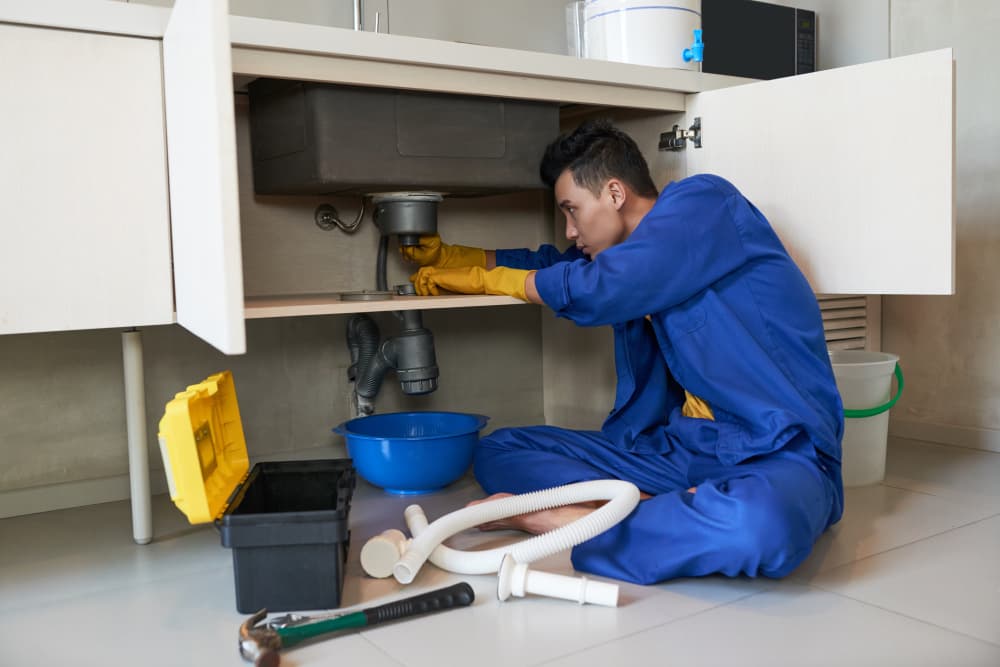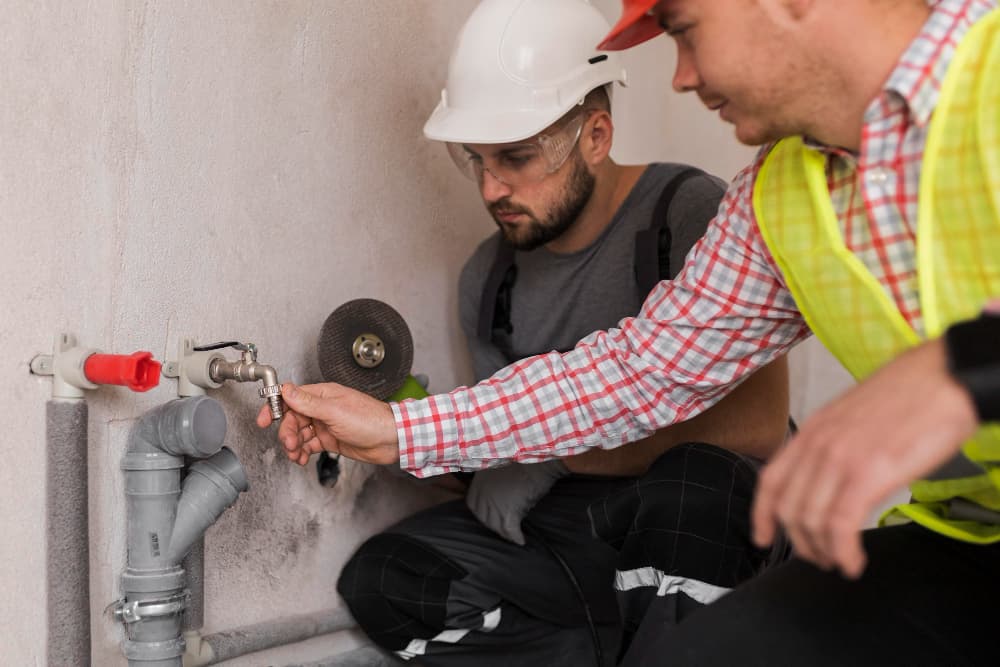Types of Plumbing Systems Every Construction Professional Should Know
Whether you're a contractor managing a construction site or a skilled tradesperson looking to expand your expertise, understanding the different types of plumbing is crucial for success in today's competitive construction industry. From residential installations to complex industrial systems, each type of plumbing requires specific skills and knowledge that can make or break your project's success.
The Three Main Types of Plumbing Systems
1. Water Supply Systems: The Lifeline of Every Building
The water supply system is arguably the most critical of all types of plumbing installations. This network of pipes delivers clean, potable water from either municipal sources or private wells directly to your faucets, showers, and appliances. Operating under constant pressure, these systems require precision installation to prevent costly leaks and ensure reliable water flow throughout the structure.

Modern water supply systems utilize various pipe materials, each suited for different applications. Copper pipes remain popular for their durability and heat resistance, lasting 50+ years with proper maintenance. PEX (cross-linked polyethylene) has revolutionized residential installations with its flexibility and freeze resistance, allowing plumbers to run continuous lines with fewer connections. CPVC offers excellent resistance to chlorinated water and high temperatures, making it ideal for hot water lines.
For construction professionals seeking skilled plumbers who understand these material differences, having the right team member can significantly impact project timelines and budgets. That's where FlexCrewUSA's AI resume builder helps you identify candidates with the exact plumbing expertise your project needs.
2. Drainage Systems (DWV): Managing Waste Efficiently
Drain-Waste-Vent (DWV) systems represent another critical category among the types of plumbing found in modern construction. Unlike pressurized water supply systems, drainage systems rely on gravity to remove wastewater from sinks, toilets, and appliances. These systems require larger diameter pipes (1¼ to 4 inches) and precise slope calculations to ensure proper flow.
The drainage system includes essential components like traps, which create water seals preventing sewer gases from entering living spaces. PVC and ABS pipes dominate residential drainage applications due to their corrosion resistance and ease of installation. Cast iron, though heavier and more expensive, remains the quietest option for multi-story buildings where noise reduction matters.
Professional plumbers understand that proper venting is crucial for drainage systems to function correctly. Without adequate air flow, water won't drain efficiently, leading to gurgling sounds and slow drainage. This technical knowledge separates experienced plumbers from novices – a distinction FlexCrewUSA's platform helps you identify when reviewing candidate profiles.
3. Venting Systems: The Unsung Hero of Plumbing
Often overlooked among the various types of plumbing, venting systems play a vital role in maintaining proper drainage and preventing dangerous sewer gases from entering buildings. These pipes extend from drainage systems through the roof, allowing air to enter while gases escape safely. Without proper venting, even the best-installed drainage system will fail to perform.
Residential vs. Commercial Types of Plumbing
Residential Plumbing: Versatility and Problem-Solving
Residential plumbing encompasses all types of plumbing work in homes and small buildings. Service plumbers in this sector might handle multiple calls daily, from water heater installations to drain cleaning. This variety demands broad knowledge across different systems and materials. Residential plumbers often work with wood-frame construction and must navigate tight spaces like crawlspaces and attics.
The pros of residential plumbing include varied daily challenges and direct customer interaction. However, emergency calls and weekend work are common. For contractors hiring residential plumbers, look for professionals comfortable with customer service and capable of explaining technical issues in simple terms.

Commercial Plumbing: Scale and Complexity
Commercial types of plumbing involve larger buildings like offices, restaurants, and retail spaces. These systems handle higher water demands and more complex waste management requirements. Commercial plumbers work with metal stud construction, larger pipe diameters, and must understand backflow prevention devices and grease traps.
Working on commercial projects often means consistent schedules and longer-term employment on single sites. Some professionals spend months or years on major developments like airports or high-rises. While this provides job security, it may involve longer commutes and less variety in daily tasks.
Industrial Plumbing: Heavy-Duty Solutions
Industrial plumbing represents the most demanding of all types of plumbing work. These systems support factories, manufacturing plants, and large-scale facilities requiring specialized equipment like heavy-duty pumps, industrial-grade valves, and chemical-resistant piping. Industrial plumbers must understand process piping, compressed air systems, and often need additional certifications for handling hazardous materials.
Gas Plumbing Systems: A Specialized Skill
Gas plumbing requires additional licensing and represents a lucrative specialization within the types of plumbing services. Black iron pipe remains the standard for residential gas lines due to its durability and heat resistance. Gas plumbers must understand pressure regulations, leak detection, and safety protocols to prevent potentially catastrophic failures.
Finding the Right Plumbing Professionals
Today's construction industry demands skilled professionals who understand multiple types of plumbing systems. Whether you need a residential service plumber or an industrial pipe fitter, identifying qualified candidates quickly matters. FlexCrewUSA's AI-powered resume builder streamlines this process, helping you match project requirements with skilled tradespeople who have the specific plumbing expertise you need.
Regional Considerations for Types of Plumbing Work
The demand for different types of plumbing varies significantly across the United States. In Texas metros like Houston and Dallas, industrial and commercial plumbing commands premium wages, with gas plumbing specialists and certified industrial plumbers earning $35-45+ per hour. California's Los Angeles and San Francisco markets show similar trends, while residential service plumbers in these areas average $25-35 per hour depending on experience.
States like Texas, California, New York, and Florida maintain some of the strictest plumbing licensing standards in the nation. Gas plumbing, medical gas installation, and backflow prevention testing require additional certifications beyond standard licenses. Industrial facilities often demand specialized certifications for handling hazardous materials, making these credentials valuable for career advancement.
Material Selection Across Different Types of Plumbing
Understanding when to use specific materials distinguishes experienced plumbers from beginners. PEX dominates residential water supply systems in new construction, particularly in cold-climate states like Minnesota, Wisconsin, and Michigan where freeze resistance matters. Its flexibility reduces installation time and connection points, making it cost-effective for large residential projects.
Copper maintains its position in commercial applications and situations requiring heat resistance. Commercial projects often specify copper for its longevity and proven track record. CPVC bridges the gap between residential and light commercial types of plumbing, offering chemical resistance at a lower cost point than copper. Professional plumbers must understand these material differences to recommend appropriate solutions for each project type.
The Future of Plumbing: Technology and Sustainability
Modern types of plumbing increasingly incorporate smart technology and sustainable practices. From leak detection sensors to water-saving fixtures, today's plumbers must understand both traditional techniques and emerging technologies. Green plumbing certifications and knowledge of LEED standards are becoming valuable differentiators in the job market. Smart home integration and IoT-enabled fixtures represent growing segments requiring additional training and expertise.
Career Paths in Different Types of Plumbing
Choosing between various types of plumbing careers depends on personal preferences and local market conditions. Residential work offers daily variety and direct customer interaction but may require evening and weekend availability. Commercial projects provide stable, long-term employment with regular hours but might involve lengthy commutes to job sites. Industrial plumbing offers the highest compensation but demands additional training and certifications.
New entrants should evaluate which specialization aligns with their interests and regional demand. Urban areas typically offer more commercial and industrial opportunities, while suburban and rural markets lean heavily toward residential service work.
Building Your Plumbing Career or Team
Understanding different types of plumbing opens doors to diverse career opportunities. Contractors need teams with varied expertise to handle diverse project requirements effectively. Finding the right mix of residential service techs, commercial installers, and specialized professionals determines project success.
FlexCrewUSA's platform connects skilled plumbers with contractors needing specific expertise. Our AI resume builder helps candidates highlight their experience across different types of plumbing work, making it easier for employers to find the perfect match for their projects. Whether you're seeking a gas plumbing specialist for a restaurant build-out or a residential service tech for maintenance contracts, our technology streamlines the matching process.
Frequently Asked Questions
Q. What are the main types of plumbing systems in buildings?
A. The three main types of plumbing are water supply systems, drainage systems, and venting systems, all working together for safe water management in buildings.
Q. Which types of plumbing work pay the best?
A. Industrial and commercial plumbing typically offer the highest wages, with specialists earning $35-45+ per hour in major metropolitan areas.
Q. What's the difference between residential and commercial plumbing?
A. Residential plumbing handles homes with simpler systems, while commercial plumbing involves larger buildings with complex systems and stricter codes.
Q. How do I choose between different types of plumbing careers?
A. Consider your preferred work environment, schedule needs, and technical interests. FlexCrewUSA's AI resume builder can help match your skills with the right opportunities.
Q. What types of plumbing require special licenses?
A. Gas plumbing, medical gas installation, and backflow prevention testing require additional certifications beyond standard plumbing licenses.
Q. Which types of plumbing systems use PEX vs. copper pipes?
A. PEX dominates residential water supply systems, while copper remains standard for commercial applications requiring durability and heat resistance.
